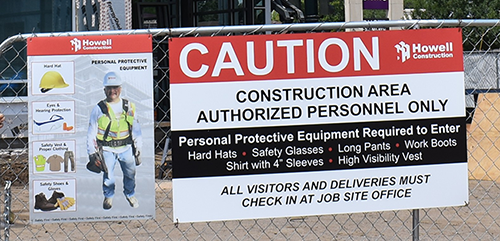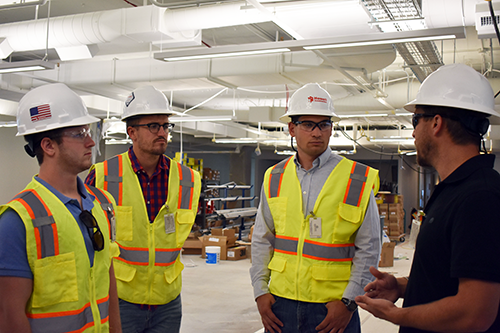Visiting a Jobsite 101
Construction sites can be intimidating, especially when you don’t know what to expect. Luckily, we’ve laid out some guidelines below to help you prepare for your first jobsite visit.
Before You Arrive
Coordination is Key.
Coordinate with the site superintendent prior to your visit, and make sure to have their contact information handy in case you have trouble finding them. It’s important to schedule your visit in advance to ensure that you pick a date and time that doesn’t interfere with the work being performed that day.
Every Jobsite is Different.
Some jobsites have specific security protocols or construction visitor parking rules, so checking in with the site superintendent before you arrive for your tour can help you avoid any mishaps.
Safety is the #1 Priority.
We don’t mess around when it comes to safety, and neither should you!

Personal Protective Equipment (PPE) should be worn at all times when visiting a jobsite, especially when construction is in progress. Some sites have extra PPE available for guests, but make sure to verify with your on-site contact before assuming it will be provided. PPE includes the following:
- Hard Hat — Head injuries are no joke, so it’s important to wear a hard hat even if construction is not in progress above you.
- Safety Glasses — While these may seem unnecessary when you’re not the one performing the work, there may be debris in the air that could get in your eyes and potentially cause permanent damage. Prescription eyeglasses typically don’t count as protective eyewear, but safety glasses should fit over them.
- Hearing Protection — Jobsites are louder than you might think, so bringing along a set of earplugs is strongly advised.
- Proper Attire — Shorts, skirts, dresses, and flowy blouses should not be worn on the jobsite. Long pants and long-sleeve tops can help mitigate the risk of injury from sharp or hot materials.
- Closed-toe Shoes — While you probably won’t need steel-toe boots for your tour, regular boots or other closed-toe shoes (especially with a thick sole) can prevent a stray nail from puncturing your skin. Heels should never be worn on-site, even if they are closed-toe. If you are visiting a ground-up construction site, you may want to factor in potential dirt & mud when making your shoe selection.
- Safety Vest — A safety vest helps identify who is authorized to be on the jobsite. It can also help workers see you when operating heavy equipment.
During Your Visit
Exercise Caution.
Construction sites are filled with expensive, potentially dangerous equipment and materials. It may feel natural to lean up against a wall or rest your hand on a countertop, but the surface could be unstable. Also, be sure to watch your step – even the cleanest job site can be a minefield if you don’t pay attention!
Be Respectful.
Many on-site personnel are subcontractors and laborers who are working against tight deadlines, so try to stay out of their way when possible. The site you’re visiting may also have other tenants occupying the building, so be mindful when passing through shared spaces.
Ask Questions!
As a visitor, you’re not expected to know what everything is on-site. Take the opportunity to ask questions to get the most out of your tour.

Tip: Some jobsites have rules against taking photos, so be sure to ask the site superintendent for permission prior to pulling out your camera.
Wrapping Up Your Visit
Upon leaving, return any borrowed PPE and/or access badges. Hosting a tour takes valuable time out of a superintendent’s busy schedule, so be sure to thank them for showing you around as well!
By following these simple guidelines, your jobsite visit is sure to be a success.
Being a new start up company, I appreciate the tips for professional procedure and safety. I plan to implement this to my staff at every job location. Thank you.